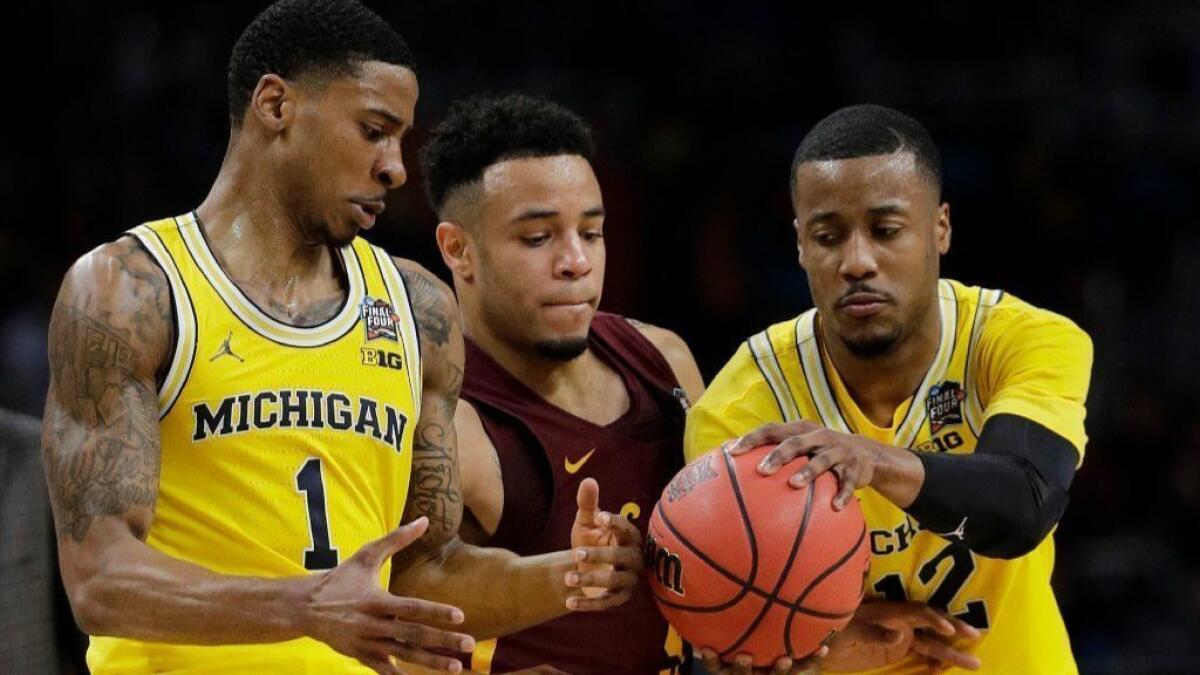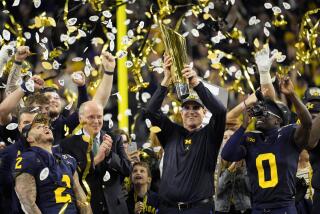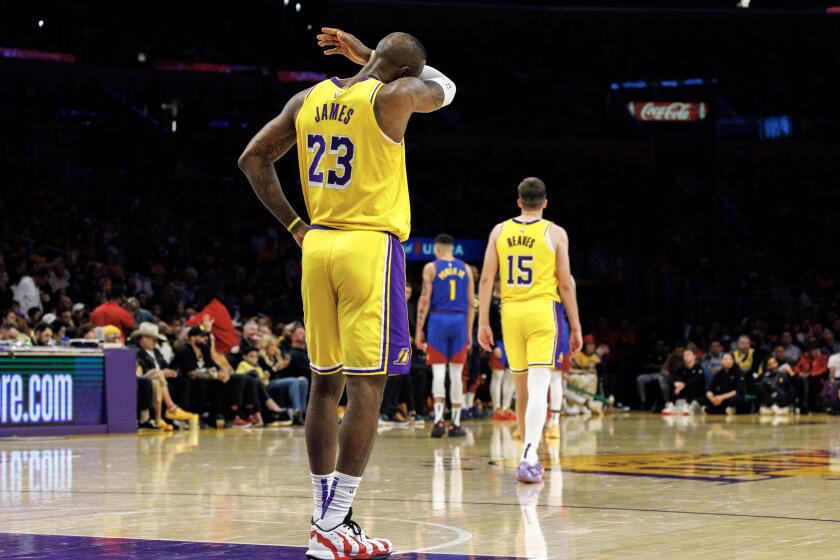Michigan’s commitment to defense gets biggest test against Villanova in NCAA championship game

Villanova’s offense is like a riddle without an answer. Each of the Wildcats’ rotation players can shoot, pass and dribble with precision. They space the floor and have made more three-pointers than any major college team in history.
Michigan’s counter to the nation’s most efficient offense starts with someone who won’t put a hand in anyone’s face or rotate to contest a jumper during the NCAA tournament national championship game Monday night at the Alamodome.
He is a former high school history teacher who has helped put the Wolverines on the brink of what would be their first national title under coach John Beilein after reviving their commitment to defense since his arrival in Ann Arbor last summer.
“I just wanted somebody that just thinks and breathes defense,” Beilein said Sunday.
He found it in Luke Yaklich, a former Illinois State assistant who watched last year’s Final Four in a cabin with his father-in-law during a fishing trip in central Illinois. Now he’s one victory away from reeling in every coach’s dream.
“You work for this moment, to be ready for it,” Yaklich said while surrounded by reporters inside a trainer’s room, “but you can’t say you’re ever going to get there.”
The Wolverines are close in large part because they rank No. 3 in the nation in defensive efficiency, according to the metrics of Ken Pomeroy. Their previous rankings in that category under Beilein: No. 69, No. 92, No. 100, No. 89, No. 37, No. 56, No. 37, No. 58, No. 67 and No. 129.
Enough bad defense was enough. Beilein realized change was needed but lucked into hiring Yaklich only after Illinois State coach Dan Muller called to recommend his fourth-year assistant, whose name was unfamiliar to Beilein.
Yaklich, 41, initially wavered when offered the job, considering the wishes of his three school-age children, before his wife talked him into accepting his first major-conference job.
The former longtime high school coach prefers a simple approach to teaching defense. He continuously asks his players the same set of questions after hatching his defensive game plans: Is this confusing? Can we do this? Do you see yourself being successful with this?
“It’s not what we know as coaches,” Yaklich said, “it’s what they can execute and feel comfortable doing.”
Forward Duncan Robinson said the Wolverines never feel overwhelmed by information.
“He does a really good job of giving us only what we need to know; he doesn’t give us too much,” Robinson said. “For me personally, to be out there and not thinking but knowing what I need to do and being able to react on instinct is big.”
The Wolverines have unveiled an attacking defense that’s been good at not only limiting success from beyond the three-point line — opponents are shooting only 32.7% from long range — but preventing teams from getting off scads of three-pointers, forcing them instead to take less-efficient long two-point shots.
That could be a difference maker against Villanova, which has made an NCAA Division I record 454 three-pointers this season.
The statistic Yaklich tracks that often is telling about the Wolverines’ success in stopping three-pointers is the percentage of shots contested. The target mark is at least 70%. During Michigan’s 69-57 victory over Loyola Chicago in the national semifinal, Yaklich said, the Wolverines contested 74% of the Ramblers’ shots.
Loyola made only one of 10 three-pointers.
“We say it all the time, ‘You can’t hope people miss, you have to make them miss,’ ” Yaklich said, “and you make people miss because you contest and our contest rate is the backbone of how we play defense.”
Of course, Villanova represents a supersized and superskilled version of Loyola that will present unique challenges. Yaklich said preparing to stop Wildcats point guard Jalen Brunson, a dynamic playmaker who can score from anywhere inside 30 feet of the basket, could keep him up late stewing over a pot of coffee inside a hotel ballroom.
But the eternally peppy Yaklich doesn’t consider any of his seemingly endless prep work as actual work.
“I haven’t worked a day yet,” Yaklich said, “because it’s fun teaching and coaching young people.”
That enthusiasm has extended to the players. After the Wolverines’ comeback win Saturday, guard Jordan Poole bounded over to Yaklich to bask in his mastery of a defensive concept.
“He said, ‘Did you see it? Did you see it?’ ” Yaklich recalled. “ ‘I executed the switch properly!’ It was like an aha moment. It was fun.”
Michigan’s defense allowed it to prevail over the Ramblers despite the Wolverines scoring only 22 points in the first half; Loyola was held to 27 to that point and then 30 points in the second half, when Michigan’s offense finally clicked and it exploded for 47 points.
“We’ve been able to have a couple of games where we didn’t shoot it well yet we won,” Yaklich said, “and it’s like, hey, OK, we can do it and it just gives more credence to the more time and attention to detail in practices and games and film sessions because they know there’s transfer over to the wins and losses.”
Win or lose Monday, the Wolverines are already believers in the man behind their new defensive approach.
Follow Ben Bolch on Twitter @latbbolch
More to Read
Get our high school sports newsletter
Prep Rally is devoted to the SoCal high school sports experience, bringing you scores, stories and a behind-the-scenes look at what makes prep sports so popular.
You may occasionally receive promotional content from the Los Angeles Times.







